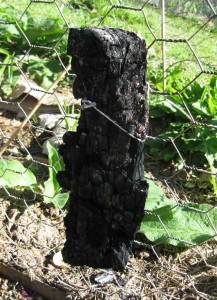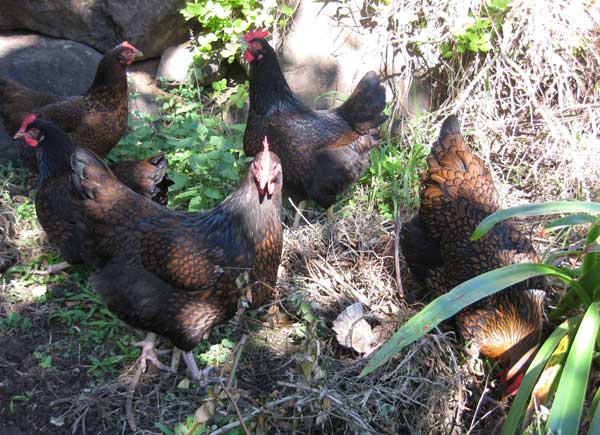Charcoal and chickens
It’s not the first thing that springs to mind when I hear the words ‘charcoal’ and ‘chicken’ together, but charcoal as a chicken feed supplement can provide real health benefits for your chooks.
Because animals’ water and feed can be exposed to contaminants – from rodents, flies or birds, for example – many poultry farmers are following an age-old practice of adding charcoal to drinking water or feed. In Europe, commercial activated charcoals have been specifically designed as an additive for cattle and poultry feed. The charcoal is able to absorb toxins from the food or water, improving hygiene and chook health. Better hygiene can also help prevent infections such as Salmonella in meat and eggs.
Wild animals will often visit sites where there have recently been fires and have been observed eating charcoal. Research suggests that they consume it for its medicinal, toxin-binding properties. While it has no nutritional value itself, charcoal contributes to keeping an animal’s digestive system healthy. It is a laxative and can help move the impurities it absorbs out of the body. If worms or worm eggs are present, it can to some degree help move them out of the body as well. Poultry feed containing 1-1.5% charcoal has resulted in increased laying rate, a longer laying period and increased egg weight. Charcoal in the diet will also reduce the odour of chook manure.
So why not produce your own charcoal for the chooks? Charcoal produced from slow-burned (untreated) timber can be added to your flock’s food or just left where the chooks can scratch and peck at it as they please. Wood ash makes a good addition to their favourite dust-bathing spots as it has a very nice texture; the chooks will eat it too.
So, shovel out ashes and charcoal from your wood-fired oven or burn some logs or larger branches in an outdoor fireplace. Slow burning is essential to charcoal making: you can damp down a fire that is burning too quickly with some water. Once it’s all cooled down, crush it up a bit and throw a handful in with the poultry feed or where the chickens will scratch. Your feathered friends will thank you for it!
Tags: animal care, chickens, poultry
Posted in Organic Gardening





I love post as this because it helps farmers like us.
Such a great idea! We get our charcoal from blackwatercarbon.com at the best price. 17.00 per pound free shipping. I am definitely using this for my girls. Thanks
I have one of my little girls that has now been laying on the eggs for 14 days. Does this mean she will be having little bidies.
Only if you have a rooster and the eggs have been fertilized. If you don’t have a rooster and the eggs are not fertilized then that means your hen has become broody.
Currently raising 21 birds. Having a bit of a conflict….the birds are a shared hobby with another person who insists on adding crushed charcoal briquettes to the feed. Would love some clarification on the differences between activated charcoal and good ol’ charcoal briquettes created from an unknown mixed source. I personally feel that the briquettes can’t be a good thing. Please provide some clarification on the subject. Don’t get me wrong, I completely understand the benefits of activated charcoal but feel uneasy about the briquettes
First off, I’m no expert, this is just a personal opinion.
I would think, that since briquettes are intended to cook human food, that they would be suitable for animals that we eat as well. Of course, this all goes back to how much you trust the commercial food producers, hence why most of us are here.
You could contact the company and see what their wood source is, and what if any additives are used to get the burn going.
Watched a documentary once. Briquettes are made from charcoal sand/dust that has been artificially pressed together using glue and other man made additives (so it’s not the lump prices created from the burn, but the broken bits too small to sell so it is further crushed then pressed).
So when u r burning briquettes, U r also burning the additives, and if U feed that to your chickens the ashes will also have remains of those additives.
Manufacturers will tell you they use food grade safe ingredients etc … But so does Monsanto, that says Agent Orange or Roundup isn’t poisonous to humans
Only Charcoal – made from wood. Activated charcoal means crushed finely where the charcoal can be beneficial to heal. Of course, too much is not good ,moderation is the key to be safe.I would not use briquettes as they have additives and perhaps burning flammable solvents to help light it to achieve burn Unless it says ‘no additives, all natural, etc.’ Be wise, Read and investigate.
Briquettes have a lot of additives and aren’t true charcoal. You can find real wood coal in bags now too.
Never heard this, what a great addition to the run area! What about burning logs and not letting burn completely? Like having half-charred logs in there. Would that work? Will chickens only eat from them if they are sick or need it? Thx for great info!!
OK, so wood ash + water = lye, a caustic agent. Please clarify how this doesn’t produce lye if left in the rain?
Thanks.
You have to boil them to get lye.
BRIQUETTES ARE NOT THE SAME AS CHARCOAL AND ARE LOADED WITH TOXIC ADDITIVES.
DO NOT, EVER, FEED BRIQUETTES TO YOUR CHICKENS!!
One doesn’t know what might be in briquettes, I won’t even grill with them. However, one can buy lump hardwood charcoal where briquettes are sold and they should be safe.
That explains why the morning after we have a bonfire my chickens take dust baths in the fire pit. And here we were laughing at the “dumb” birds.
And the joke is on us right!? The ash contains exactly what they need. We learn to be better providers.
Mine are in a field where we burned bush, the white girls are now fifthy dark grey
lol but they are healthy, happy and their eggs have lots of weight to them!!!
They love to dig and lay in the burnt areas ?
Activated charcoal capsules are fairly cheap on Amazon Prime or in some grocery store’s vitamin supplement area. About $6 for 100 caps. Very good to use. I open up one capsule and mix with warm water in a shot glass (so it’s less than one once) and give it to my chicken using a feeding syringe (the type without the needle head). Very good for human food poisoning as well. When I see my chicken, dog, or cat not feeling well from something bad they posibbly have eaten, it’s charcoal time.
Thank you ,you’ve given me some hope for my little chick who’s not well.
“Poultry feed containing 1-1.5% charcoal has resulted in increased laying rate, a longer laying period and increased egg weight.” Would you please cite the research to back this statement up.
Thank you
This site is a welcome resource! Thanks! Jane in California